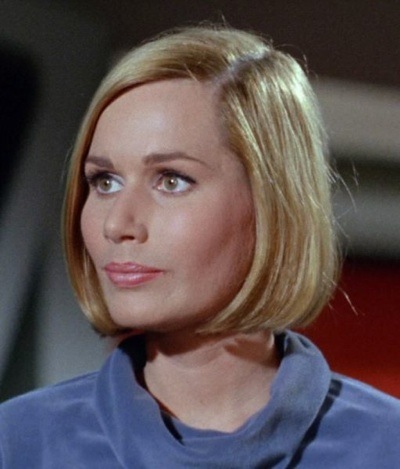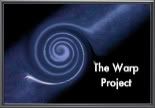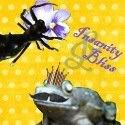
Sabrina 9 years old brings up an interesting question at the end of her summary of "Where No Man Has Gone Before." She says she doesn't know why the doctor dies helping to kill Mitchell in the end. The doctor had apparently the same powers as Mitchell, and yet uses them to dutifully help Captain Kirk in the annihilation of Mitchell's evil super powers (by fighting, and so weakening, Mitchell himself). Sabrina 9 years old asks why the doctor is able to do so when Mitchell's powers clearly make him evil. That is, why is the doctor able to be good when it appears that the powers themselves make people evil.
Towards the end of the episode when the Psychiatrist (who we've called the doctor here) has developed her ESP abilities enough that they have become visible to the viewing audience, she appears to be under the sway of Mitchell. The two of them leave the confinement on the planet that the ship's crew had placed him in, and it is clear Mitchell intends to provide anything they need while the Psychiatrist's own powers further develop. At this point Captain Kirk appears in his attempt to kill Mitchell. Mitchell's powers have developed to the point that there is clearly (from Kirk's point of view) no other choice but to kill Mitchell. Though we are meant to expect that killing Mitchell verges on impossible.
Mitchell anticipates Kirk's advancing, however, and sends the Psychiatrist to talk with Kirk believing that she will see how "useless" humans are to them now and perhaps undo Kirk herself. Kirk pleads with her though, asking her to think about and pay attention to Mitchell's behaviors. If she does, he says, she will see that Mitchell is using them only for ill. He asks the Psychiatrist to, please, be human just a little longer; to, please, be a counselor for just a little longer. That is, to see what is really going on with Mitchell, and so what must be done by Kirk with her help. The implication here, in Kirk's account, is that she too will succumb to evil doing if she allows her own ESP to continue to develop as Mitchell's has. We might say that the answer to Sabrina 9 years old's question, then, is that the powers simply make a person evil, but it takes time and the Psychiatrist hasn't suffered under enough time yet.
But I think such an answer would be too limited a view of the ethical under currents of the episode. Mitchell showed himself to be power hungry, and without regard for others almost as soon as the anomaly shocked him. It's clear that in the moments when the ESP faded (it would fade briefly when he was shocked by other types of electrical sources) Mitchell would return to his previous self confused, and with some level of regard for his long term friend, Kirk. The entire time the ESP has shown itself in him, however, such regard has been entirely absent. Instead, he has reveled in what he can do to, and what he can know about, others because of the powers.
The doctor, on the other hand, has been fascinated with Mitchell's developing powers since they first took hold. But her fascination has been accompanied with feeling for the person, specifically Mitchell, not simply with lust for the powers themselves. Her character has been sympathetic to, and wanting to help the person that is Mitchell from the beginning. Then, too, when her extra-ESP finally takes hold (with her eyes turning silver as Mitchell's have), we see that her new powers do not develop as bold, driven powers in the way that Mitchell's appeared. Instead, her powers seem accompanied still with the enhancement of that feeling for we've seen in her from the beginning. So, when Kirk appears, she feels great sympathy for the situation--both towards Mitchell and what he has gone through in the immense change, and for Kirk in the difficulty of the situation he faces (killing his old friend).
This pilot presents a sort of character revealing circumstance in which we can see how prepared Kirk would be to act as Captain--he's smarter than a man equipped with only logic, he can make difficult choices like killing an evil-turned friend, and he can surpass the impossible by killing that friend whose power it appeared had become almost omnipotent. Interestingly, in the midst of all this, we are supposed to understand that Kirk has suffered a serious personal challenge in this episode. We are told that Mitchell is his long term friend. Indeed, the two of them regale each other with multiple stories of their shared past as the episode progresses. There is some pausing on Kirk's side early on when the initial decision to kill, or abandon Mitchell must be made. But by the end of the episode the feeling over the situation--loss of a friend, loss of a ship mate--is expressed primarily through the character of the female Psychiatrist, rather than through Kirk himself. The drama closes with her expressing insight into the challenge of the situation, without Kirk clearly responding or saying anything about the situation himself. It is in this way that the episode resembles the T.V. Western so popular at the same time. The cowboy of the 1960's television drama regularly suffers the loss of a friend in the midst of a gun fight with a band of outlaws, or a tribe of Indians. But in the face of that loss his feelings are expressed through stoic resolve. The Kirk of Peeples's pilot operates with this same desert dusted stoicism. In the end of the episode, his regard for the two--Mitchell and the Psychiatrist--occurs only in stiff, bureaucratic protocol when we see him enter into both of their records that they died fulfilling their duty. We are simply meant to understand that doing so makes Kirk a noble figure, rather than clearly feeling that it does. It is here that we can come to understand two things, then.
First, the female psychiatrist did develop her ESP inclinations further, just as Mitchell had further developed his. But Mitchell's were acted out through the kind of classic evil masculine resolve common to the time, while hers had to be enacted through the feminine sensitivity she represented in the episode. She tested high in her ESP powers before the anomaly encountered them, just as Mitchell had. But we can see that her development was around feeling other peoples feelings, a kind of early prototype for Belana Troy. Mitchell, instead, tested high, it would seem, on being able to control physical and material concerns, a different sort of ESP-type power.
Second, it is in the stoic nobility of Kirk that we can see the obvious departure from Roddenberry's pilot. As I mentioned in my earlier post, Roddenberry's pilot is far more intellectually focused in the sense that it is illustrating, and teaching particular moral lessons and principles than Peeples's is. But that is not the only important divergence to be seen. It is not simply a matter of moral principle that separates the two pilots. Peeples's captain rules with a stoic, desert demeanor, while Roddenberry's would have operated through passionate reason, a reason deep with feeling. Kirk's exhibitions of passion appear as a sort of arrogant spontaneity (admittedly only hinted at here in comparison to how clearly this trait develops in the later Kirk), while Pike's passion arises through well thought out deliberation and execution--an integral part of what it means to be a well developed deliberator. Roddenberry, then, appears to have written a true Aristotelian into his captain's seat. Something that can't be said for Peeples's Kirk.






No comments:
Post a Comment